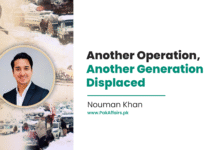The retail sector collaborates with the retailers and the consumers for the exchange of finished goods via departmental stores, retail outlets, and e-retailers. The share of the wholesale and retail sector is 34% in the overall service sector of Pakistan. According to the Punjab Board of Investment and Trade, the Retail sector is the third largest sector in Pakistan. It is the second-largest employer, employing around 16% of the labor force.
According to the report of the Economic Survey of Pakistan, the sectoral share of Services in GDP for FY2020 is 61.40 percent. The retail sector of Pakistan is moving away from conventional small ‘mom and pop’ stores to prestigious malls, supermarkets, discount stores, and specialty stores. Retailers in Pakistan are investing in real estate rental properties by attracting consumer aspiration towards real estate. Planet Retail, a global retail forecasting firm in its recent report, has calculated the country’s retail market size to be around $152 billion with an annual growth rate of 8%.
While attending the seminar arranged by the State Bank of Pakistan, the Chairman, and CEO of Gul-Ahmed stated that the sector will become more competitive in global value chains. It has an extensive chain of more than 40 retail stores across the country, offering a diverse range of products from home accessories to fashion clothing.
The retail sector in Pakistan is exponentially growing with the passage of time due to developing urbanization. The middle-class consumers and the youth, along with the improvement of per-capita income have paved the way in generating volume sales. Recently, encouraging growth in retail outlets in current years has been recorded by the local footwear industry by producing some assuring brands like Servis, Ehsan Chappal House (ECS), Stylo, Metro, Starlet, Borjan, Urban sole. The retailers have completely altered the consumer perception in Pakistan.
The ratio of the upper medium class has enormously contributed to the growth of the food and fashion sector. Al-Fateh departmental stores, Canteen Stores Department (CSD), Utility Stores Corporation (USC), and Imtiaz Supermarket have grown immensely, with its contribution to FMCG businesses and also by playing a crucial role in the allocation of the consumer goods under one umbrella.
As a result of globalization, the global players have changed the dimensions of the retail sector as Metro-Makro did in past by operating more than ten stores in major cities of including Karachi, Lahore, Islamabad, and Faisalabad. Retailers in Pakistan have shifted their focus to revenue growth, profitability, unique consumers, capital deployment, and cash management.
Many local brands have expanded and are now adopting modern trends. The phenomenal growth in the retail sector is pivotal for the country’s economic health, as the sector can create enormous job opportunities and attract foreign investment into the country by alluring global brands to the local market. COVID-19 has prompted a spike in demand for cold and influenza cures, invulnerability boosting nutrients and dietary enhancements just as analgesics, with higher transactions of-the-counter medications, to a great extent has been identified with stock accumulation and less treatment.
According to a survey conducted by the Pak-Retailers platform, deduced two major findings. First, the organized retail penetration is almost 5% in Pakistan. Second, the limitations that occurred due to the lack of communication between the company and the retailer is hampering the growth of the retail sector in Pakistan.
The retail sector in Pakistan is uniquely unorganized. There are intrinsic limitations that lead towards dissemination of incorporate SME’s, lack of financial strength, and lower level of functional expertise. Retailers have started appealing to customers to support their local shops to help them survive the COVID-19 pandemic, which has devastated high street trade.
The absence of concrete data and authentic information have paved slapdash paths which do not permit foreign entities in Pakistan. The government of Pakistan should gather accurate information by accessing the complete record of the number of retail entrants in the economy.
The government should provide a pleasant business environment to retail employers in order to boost the growth of the retail sector. There is a dire need for security provision in the sector of tourism by the government of Pakistan so that they may actively participate in bringing the large volume of sales in the retail sector. As we know that after every short period of time the tax regime changes which creates hurdles and uncertainties for retailers. The consistent regulation of the tax regime by the government of Pakistan can help in reshaping the unorganized and collapsed structure of the retail sector.
E-Commerce, the Eventual Fate of Pakistan
The number of registered e-commerce business vendors expanded emphatically over the review period of time in Pakistan due to the accessibility of internet connectivity across the country, essentially on account of less expensive cell phones. Significant advertising efforts, a faithful client base, a gigantic item grouping, and great customer care kept daraz.pk at the front line of internet retailing in Pakistan. COVID-19 cases have developed in business sectors around the globe, numerous retailers have bolted due to government orders. The driving force behind the clearance of stocks and smooth run of sale discounts is E-commerce which is used by almost every retailer.
The biggest categories within internet retailing in Pakistan relative to FMCG businesses are Consumer electronics, and footwear with the grocery category to be in its initial phase. For the expansion of the retail industry, advanced technological reforms must be incorporated by the retail matrix. The government should design policy in a way that can smooth the transaction of the retail sector.




